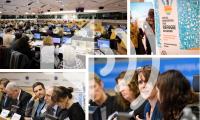
Meghan Benton
Director, International Program
Meghan Benton is Director of the International Program at MPI, where her work spans a wide range of areas including labor mobility, immigrant integration, border management, and humanitarian protection. She has a particular interest in the role of technological and social innovation in immigration and integration policy, and in how labor market disruption affects immigration and integration. In 2016, she co-founded MPI Europe’s Integration Futures Working Group, which seeks to develop a forward-looking agenda for integration policy in Europe. Most recently, she has been working on how the COVID-19 pandemic has reshaped global mobility. She convenes MPI’s Task Force on Borders and Mobility During and After COVID-19.
|
Media Requests |
Dr. Benton previously was a Senior Researcher at Nesta, the United Kingdom’s innovation body, where she led projects on digital government and the future of local public services. Prior to joining Nesta, she was a Policy Analyst at MPI from 2012-15, where she co-led an MPI-International Labor Organization six-country project on pathways to skilled work for newly arrived immigrants in Europe. She also worked on Project UPSTREAM, a four-country project on mainstreaming immigrant integration in the European Union. Previously, she worked for the Constitution Unit at University College London and the Institute for Public Policy Research.
Dr. Benton received her PhD in political science from University College London in 2010, where her PhD research focused on citizenship and the rights of noncitizens. She also holds a master’s degree in legal and political theory (with distinction) from University College London, and a bachelor’s degree in philosophy and literature from Warwick University.
Bio Page Tabs
This Migration Policy Institute Europe webinar examines possible scenarios for how social, economic, and technological trends could affect jobs, labor market policy, education and social policies, and migrant integration. Speakers also explored the potential of coding schools for refugees to help alleviate skills shortages and provide a pathway to work.
Amid the arrival of hundreds of thousands of children during the migration crisis in Europe, school systems are increasingly being called upon to find innovative ways to address growing diversity and support children with migrant backgrounds.
Following the arrival of large numbers of migrants and asylum seekers in Europe from 2015 onwards, many nontraditional actors—from tech start-ups to social enterprises—pioneered solutions to foster the social and economic inclusion of newcomers.
As the European Council gears up to move onto the next phase of Brexit negotiations, this MPI Europe webinar features findings from an MPI Europe report that offers a demographic profile of the approximately 1 million UK citizens living in the European Union and examines the ways in which many are likely to see their futures significantly reshaped after Brexit. The discussion takes stock of citizens' rights, reflects on what may happen next, and considers the prospects for Britons abroad both in a situation of ‘no deal’ and if there is an ultimate agreement.
This MPI webinar explores the recent “tech turn” in refugee protection and integration, and considers whether the tech community's interventions in this area are likely to have a lasting impact. Speakers discuss the most promising innovations and their broader implications for policymakers.












The Ukrainian Conflict Could Be a Tipping Point for Refugee Protection
Managing Mobility in the Pandemic Era Requires World to Buy In on Shared Principles
Can Omicron Finally Get the World to Cooperate on Pandemic Mobility Management?
As the United States Lifts Travel Restrictions, Its New Vaccination Requirements Could Shape the Future of Global Mobility
The Rocky Road to a Mobile World after COVID-19
Coronavirus Is Spreading across Borders, But It Is Not a Migration Problem
Brexit Day—Is This the Dawning of the Age of Immobility?
Too Little, Too Late? Contingency Planning for UK Nationals in Case of a No-Deal Brexit
The Good, the Bad, and the Fuzzy: Brexit Negotiating Stance towards Mobile EU Nationals Unveiled
A Game of Chess, Not Tennis: Unraveling the Rights and Status of “Brexpats”